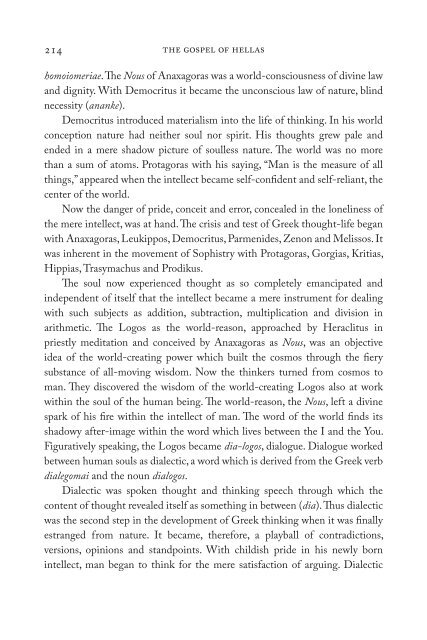The Gospel of Hellas - Research Institute for Waldorf Education
The Gospel of Hellas - Research Institute for Waldorf Education
The Gospel of Hellas - Research Institute for Waldorf Education
Create successful ePaper yourself
Turn your PDF publications into a flip-book with our unique Google optimized e-Paper software.
the gospel <strong>of</strong> hellas<br />
homoiomeriae. <strong>The</strong> Nous <strong>of</strong> Anaxagoras was a world-consciousness <strong>of</strong> divine law<br />
and dignity. With Democritus it became the unconscious law <strong>of</strong> nature, blind<br />
necessity (ananke).<br />
Democritus introduced materialism into the life <strong>of</strong> thinking. In his world<br />
conception nature had neither soul nor spirit. His thoughts grew pale and<br />
ended in a mere shadow picture <strong>of</strong> soulless nature. <strong>The</strong> world was no more<br />
than a sum <strong>of</strong> atoms. Protagoras with his saying, “Man is the measure <strong>of</strong> all<br />
things,” appeared when the intellect became self-confident and self-reliant, the<br />
center <strong>of</strong> the world.<br />
Now the danger <strong>of</strong> pride, conceit and error, concealed in the loneliness <strong>of</strong><br />
the mere intellect, was at hand. <strong>The</strong> crisis and test <strong>of</strong> Greek thought-life began<br />
with Anaxagoras, Leukippos, Democritus, Parmenides, Zenon and Melissos. It<br />
was inherent in the movement <strong>of</strong> Sophistry with Protagoras, Gorgias, Kritias,<br />
Hippias, Trasymachus and Prodikus.<br />
<strong>The</strong> soul now experienced thought as so completely emancipated and<br />
independent <strong>of</strong> itself that the intellect became a mere instrument <strong>for</strong> dealing<br />
with such subjects as addition, subtraction, multiplication and division in<br />
arithmetic. <strong>The</strong> Logos as the world-reason, approached by Heraclitus in<br />
priestly meditation and conceived by Anaxagoras as Nous, was an objective<br />
idea <strong>of</strong> the world-creating power which built the cosmos through the fiery<br />
substance <strong>of</strong> all-moving wisdom. Now the thinkers turned from cosmos to<br />
man. <strong>The</strong>y discovered the wisdom <strong>of</strong> the world-creating Logos also at work<br />
within the soul <strong>of</strong> the human being. <strong>The</strong> world-reason, the Nous, left a divine<br />
spark <strong>of</strong> his fire within the intellect <strong>of</strong> man. <strong>The</strong> word <strong>of</strong> the world finds its<br />
shadowy after-image within the word which lives between the I and the You.<br />
Figuratively speaking, the Logos became dia-logos, dialogue. Dialogue worked<br />
between human souls as dialectic, a word which is derived from the Greek verb<br />
dialegomai and the noun dialogos.<br />
Dialectic was spoken thought and thinking speech through which the<br />
content <strong>of</strong> thought revealed itself as something in between (dia). Thus dialectic<br />
was the second step in the development <strong>of</strong> Greek thinking when it was finally<br />
estranged from nature. It became, there<strong>for</strong>e, a playball <strong>of</strong> contradictions,<br />
versions, opinions and standpoints. With childish pride in his newly born<br />
intellect, man began to think <strong>for</strong> the mere satisfaction <strong>of</strong> arguing. Dialectic

















